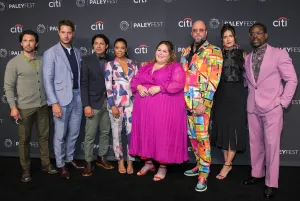Netflix is sparking controversy again, this time over its portrayal of autism in new show Atypical.
The series, which debuted August 14 on the streaming service, follows the story of a teenage boy named Sam who is on the spectrum.
Videos by PopCulture.com
Though autism is a theme we’ll see in abundance in television this year and many disability advocates praise networks for bringing this group of people to the small screen, will they be as satisfied once they see the shows’ portrayal of autistic people?
So far, Atypical has received mixed reviews. Many viewers praise the show for its efforts, relating the storyline to autistic people in their lives. Others, including autistic actor Mickey Rowe, criticized the show’s ‘flawed’ portrayal of Sam.
Rowe offered criticism of the shows writers, claiming that the show only furthers stereotypes and seems to use the disorder as a source of humor rather than a platform for education.
Though he appreciates reports that claim writers worked with top autism researchers to portray the disorder properly, Rowe says the script “seems to play into stereotypes that I’ve experienced firsthand that could have easily avoided and that may present damaging information about autistic people,” he told Teen Vogue.
Among the examples he shares, the actor recalls a scene in which Sam tells his therapist he can see her purple bra. “As he does each of these things, it feels like the audience is supposed to laugh at how weird and different Sam is,” Rowe criticizes. “This is the crux of Atypical‘s comedy, but there’s nothing that funny about turning someone’s disability into a punchline.”

The nature of this show hits close to home for Rowe, but one lead investigators at the UCLA Center for Autism Research and Treatment understands his concerns.
“I do think that the media portrayal is focused on high-functioning autism where it’s kids who have language and are gifted in other areas,” says Dr. Shafali Jeste to Daily Mail Online. “That doesn’t represent the large majority of kids who do have cognitive or other issues.’
With that said, autism is appropriately named as a spectrum, meaning that no two autistic children function in the same way or are triggered by the same things.
‘It’s essentially impossible to portray everyone on the spectrum. There’s a famous quote, “if you’ve met one child with autism, you’ve met one child with autism”. So it’s tough,” Jeste said to give the show a fair amount of credit. “And it’s way harder to depict a child that has no language or has severe anxiety without being over-exaggerated or extreme.”
Though she has yet to watch the show, she commends the show for being “brave enough” to start a dialogue about autistic people in society, even if it is one person’s journey.
As for Netflix, this isn’t the company’s first go at fielding criticism of its content and storylines. In March, the streaming service was the talk of heightened debate over its debut season of ’13 Reasons Why’, a show depicting teenage suicide and mental health issues. Critics called the show, which shows a high-school girl’s suicide and the fallout when classmates are ‘blamed’ for her death, called the show ‘triggering’ and said it makes suicide look all but permanent.
Despite blacklash from celebrities and reports of suicides which appeared to be modeled after the show’s main character’s death, the series was renewed for a second season.
In June, the network also took heat for its film To the Bone, which follows one young woman’s rocky recovery from an eating disorder. Critics of this show said it glorified anorexia and encouraged the illness among impressionable youth.
Actress Lily Collins played the film’s anorexic young woman, and she’s been candid about her own journey with the disorder. During filming, she says she was complimented by a family friend on her looks, even though she was trying to embody the look of her half-starved character.
“That is why the problem exists,” Collins said of the scary encounter, as published by The Edit. Collins supports the film’s effort to bring the struggles of anorexia to light and praises its portrayal of an individual battling the disease.
Most Viewed
-

HOLLYWOOD, CALIFORNIA – APRIL 02: (L-R) Milo Ventimiglia, Justin Hartley, Jon Huertas, Susan Kelechi Watson, Chrissy Metz, Chris Sullivan, Mandy Moore, and Sterling K. Brown attend the 39th annual PaleyFest LA – "This Is Us" at Dolby Theatre on April 02, 2022 in Hollywood, California. (Photo by Rodin Eckenroth/FilmMagic)







